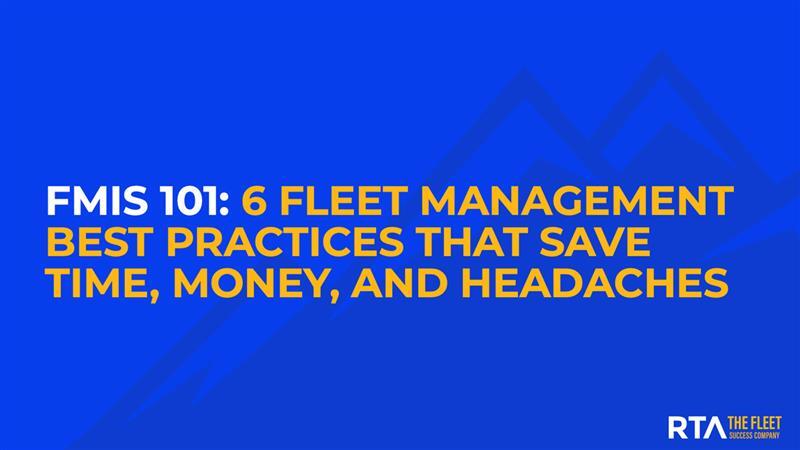Webinar - FMIS 101: 6 Fleet Management Best Practices that Save Time, Money, and Headaches

“Asset availability is the granddaddy of all fleet metrics.” Nathan Schafer, Fleet Success Manager, RTA
When it comes to fleet management, success isn’t just about keeping vehicles moving, it’s about creating systems that move your entire operation forward. In the second part of RTA's FMIS 101 webinar series, industry veterans Dallin Dastrup and Nathan Schafer unpack six game-changing best practices that every fleet operation should implement to improve efficiency, reduce downtime, and recover hidden costs.
Whether you’re transitioning from spreadsheets or optimizing a mature fleet operation, these insights are practical, proven, and powered by modern fleet maintenance management software.
1. Track Asset Availability, Your #1 Metric
Availability (or downtime) is the single most important KPI for any fleet. If you’re not tracking it, you’re flying blind.
Using a Fleet Maintenance Management System (FMIS), you can automate asset status updates and trigger notifications to reduce interruptions, eliminate manual check-ins, and improve communication between shops and operators. With RTA’s Fleet 360, availability status is tied to work order status, giving real-time insights that reduce inefficiency across your fleet.
2. Automate PM Tracking and Notifications
Sticking a decal on the dash isn’t enough. Preventive Maintenance (PM) must be tracked digitally to avoid costly breakdowns and compliance failures.
Fleet maintenance software like Fleet 360 enables automated PM schedules and sends push notifications to operators, supervisors, and directors, customized by mileage, time, or usage thresholds. This keeps your team proactive, not reactive.
3. Recover Hidden Costs with Parts Warranty Tracking
Are you throwing away thousands each year on parts still under warranty?
Tracking part warranties allows you to recover costs, identify low-performing vendors, and spot patterns, like the city that discovered faulty batteries after their vendor changed manufacturers. With FMIS tools, warranty claims can be automatically triggered when a part is reused within a specific timeframe, ensuring nothing slips through the cracks.
4. Don’t Miss Out on OEM Warranty Claims
OEMs set aside billions annually for warranty recovery. Yet, many fleets fail to take advantage.
By tracking OEM warranties in your FMIS, you can automatically flag repair jobs and receive alerts before warranties expire. The result? Saved time, saved money, and fewer surprise failures just outside the warranty window.
5. Schedule Custom Reports to Save Hours Each Month
How much time do you spend pulling reports each month?
With automated reporting tools built into Fleet 360, users have reclaimed hours by scheduling recurring reports on PM compliance, parts usage, vehicle status, and more. These reports are automatically generated, customized, and emailed—no more last-minute scrambles.
6. Use Dashboards That Deliver Actionable Data
Data overload is real, and it’s only getting worse.
A customizable dashboard helps you focus on the critical few metrics that matter. Fleet 360’s user and role-based dashboards offer at-a-glance visibility into everything from technician productivity to vehicle availability and cost-per-mile. Pair dashboards with AI tools (like RTA’s “Ron”) to ask direct questions and receive actionable answers in seconds.
Key Takeaways
-
Availability should be your top-tracked fleet KPI, automate it with FMIS.
-
Automated PM alerts improve compliance and reduce costly breakdowns.
-
Warranty tracking (parts + OEM) can recover thousands in hidden savings.
-
Custom dashboards and scheduled reports simplify decision-making and boost visibility.
-
Centralized data management enables smarter, faster fleet decisions.
With RTA’s Fleet 360 system, these practices aren’t just possible, they’re simplified and automated. Whether you manage a government fleet, utility fleet, or commercial operation, embracing software for fleet maintenance is the fastest way to increase uptime and reduce operating costs.
Speaker Bios
Dallin Dastrup – A seasoned product manager at RTA with 8+ years of experience spanning sales, customer service, and success. Dallin is passionate about building innovative solutions to address real fleet challenges and elevate operational performance.
Nathan Schaefer – RTA’s Customer Success Manager and industry veteran with 25+ years of hands-on fleet experience, including managing an award-winning government fleet. Nathan is an advocate for FMIS adoption and trains clients on maximizing Fleet 360.
